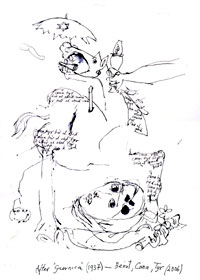We must speak out
Today we are launching an appeal for a world-wide cultural boycott against the Israeli state.
John Berger
UK Guardian newspaper, December 15, 2006
 Today I am supporting a world-wide appeal to teachers, intellectuals and artists to join the cultural boycott of the state of Israel, as called for by over a hundred Palestinian academics and artists, and – very importantly – also by a number of Israeli public figures, who outspokenly oppose their country’s illegal occupation of the Palestine territories of the West Bank and Gaza. Their call, printed in the Guardian today, can be read here. A full list of signatories can be found here.
Today I am supporting a world-wide appeal to teachers, intellectuals and artists to join the cultural boycott of the state of Israel, as called for by over a hundred Palestinian academics and artists, and – very importantly – also by a number of Israeli public figures, who outspokenly oppose their country’s illegal occupation of the Palestine territories of the West Bank and Gaza. Their call, printed in the Guardian today, can be read here. A full list of signatories can be found here.
(The drawing, After Guernica, is by John Berger.)
The boycott is an active protest against two forms of exclusion which have persisted, despite many other forms of protestations, for over 60 years – for almost three generations. During this period the state of Israel has consistently excluded itself from any international obligation to heed UN resolutions or the judgement of any international court. To date, it has defied 246 Security Council Resolutions.
As a direct consequence seven million Palestinians have been excluded from the right to live as they wish on land internationally acknowledged to be theirs; and now increasingly, with every week that passes, they are being excluded from their right to any future at all as a nation. As Nelson Mandela has pointed out, boycott is not a principle, it is a tactic depending upon circumstances. A tactic which allows people, as distinct from their elected but often craven governments, to apply a certain pressure on those wielding power in what they, the boycotters, consider to be an unjust or immoral way. (In white South Africa yesterday and in Israel today, the immorality was, or is being, coded into a form of racist apartheid.)
Boycott is not a principle. When it becomes one, it itself risks becoming exclusive and racist. No boycott, in our sense of the term, should be directed against an individual, a people, or a nation as such. A boycott is directed against a policy and the institutions which support that policy either actively or tacitly. Its aim is not to reject, but to bring about change.
How to apply a cultural boycott? A boycott of goods is a simpler proposition, but in this case it would probably be less effective, and speed is of the essence, because the situation is deteriorating every month (which is precisely why some of the most powerful world political leaders, hoping for the worst, keep silent).
How to apply a boycott? For academics it’s perhaps a little clearer – a question of declining invitations from state institutions and explaining why. For invited actors, musicians, jugglers or poets it can be more complicated. I’m convinced, in any case, that its application should not be systematised; it has to come from a personal choice based on a personal assessment.
For instance: an important mainstream Israeli publisher today is asking to publish three of my books. I intend to apply the boycott with an explanation. There exist, however, a few small, marginal Israeli publishers who expressly work to encourage exchanges and bridges between Arabs and Israelis, and if one of them should ask to publish something of mine, I would unhesitatingly agree and furthermore waive aside any question of author’s royalties. I don’t ask other writers supporting the boycott to come necessarily to exactly the same conclusion. I simply offer an example.
What is important is that we make our chosen protests together, and that we speak out, thus breaking the silence of connivance maintained by those who claim to represent us, and thus ourselves representing, briefly by our common action, the incalculable number of people who have been appalled by recent events but lack the opportunity of making their sense of outrage effective.
Full details of the campaign and add your name at www.bricup,.org.uk or email info@bricup.org.uk.


